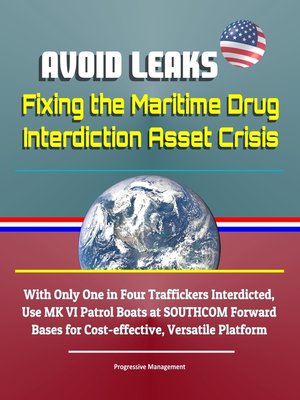Avoid Leaks
ebook ∣ Fixing the Maritime Drug Interdiction Asset Crisis--With Only One in Four Traffickers Interdicted, Use MK VI Patrol Boats at SOUTHCOM Forward Bases for Cost-effective, Versatile Platform

Sign up to save your library
With an OverDrive account, you can save your favorite libraries for at-a-glance information about availability. Find out more about OverDrive accounts.
Find this title in Libby, the library reading app by OverDrive.



Search for a digital library with this title
Title found at these libraries:
| Library Name | Distance |
|---|---|
| Loading... |
This report has been professionally converted for accurate flowing-text e-book format reproduction. The complete decommissioning of Navy frigates has produced a range of concerns regarding the United States' maritime interdiction mission to remove drug traffickers and prevent illicit drugs from reaching the homeland. As the principal interdiction tool in the high seas, Coast Guard cutters have reported a significant increase in maritime seizure of cocaine, which is aligned with the dramatic increase in supply. Due to the decrease in maritime interdiction assets, however, only one in every four maritime drug events is interdicted and the rest pass safely through the security gap. This thesis examines the Navy's newly acquired MK VI patrol boat to determine its suitability for the high seas. This is conducted through policy analysis of the Navy's counterdrug mission and technology assessment of the MK VI. The research determined that MK VI application in the high seas, versus the littorals, would not be suitable; however, the Navy can engage the problem with creative ideas to mitigate the challenges with the MK VI. This thesis proposes the allocation of MK VI to forward naval bases in SOUTHCOM. The MK VI is a cost-effective, capable, and versatile platform that would tremendously help the Navy avoid maritime drug event leaks.
This compilation includes a reproduction of the 2019 Worldwide Threat Assessment of the U.S. Intelligence Community.
I. Introduction * A. Research Question * B. Problem Statement * C. Literature Review * 1. State of Maritime Drug Operations * 2. State of Maritime Interdiction Operations * 3. Vessel Procurement in the Navy * D. Research Design * E. Thesis Overview * II. United States Maritime Drug Interdiction * A. Navy's Maritime Security Strategies * 1. A Cooperative Strategy for 21st Century Seapower * 2. Naval Operations Concept * B. The Navy's Counterdrug Strategy And Actions * C. Counterdrug Strategy And Actions Analysis * 1. Problem * 2. The Evidence * D. Conclusion * III. Technology Assessment of U.S. Navy's MK VI Patrol Boat * A. Current Technology * 1. Coast Guard Cutters * 2. Medium Endurance Cutter * B. MK VI Patrol Boat Technology * 1. MK VI Background * 2. MK VI Technology * 3. Impact of MK VI Technology * C. Conclusion * IV. Interdiction Strategy and MK VI Technology * A. Suitability * 1. In the High Seas * 2. In the Littorals * B. Trade-Offs * 1. MK VI Operating in U.S. Littorals Would Be More Cost-Efficient but Would Not Significantly Reduce Maritime Drug Smugglers * 2. The MK VI Would Yield Higher Drug Interdiction Rates on the High Seas but Would Be Too Far Away from Home Base, Which Would Increase Fuel Costs * V. Conclusion and Recommendations * A. Conclusion * B. Recommendations * 1. Procure More MK VI Patrol Boats * 2. Deploy the MK VI to Potential Forward Bases * 3. Use Fuel Buoys or Host Ship for Refueling







